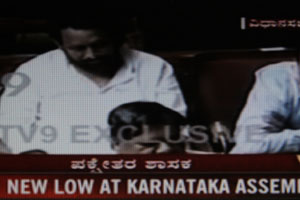A deliberate hypocrisy
The media opinion on what the three Karnataka Ministers watched on their cellphones in the Assembly has travelled at great speed, while the information available to the public on the episode is scrappy.
ARUNODAY MAJUMDER wonders if what the three people’s representatives watched could be called “pornographicâ€.
_150_200.jpg)
The latest sensation which has just been served live and loud is that of Ministers having watched “pornography” in a State Assembly. The moot point is the character of the content itself. But trust the intellectual calibre of journalists and the monophonic reactions from the news media stand explained. Droning hyperboles – “shameful”, “criminal”, “resign”, “expel” – have been employed to articulate disgust and demand.
The instruction manual for manufacturing consent has been followed, opinion has travelled at the speed of light and with the force of gravity leaving information behind and buried. The Pied Pipers of television stations and newspaper houses are once again leading the targets of their speech and script to delusion. Their music fills the air not because of their mastery over the flute but because nobody else has access to flute. Less metaphorically, they don the air of omniscience not because knowledge is at their disposal but because the means (the physical infrastructure) of producing it is. In this article the author revisits the information to attempt a sincere perspective of the event as opposed to the episode that has been performed on news soap opera.

The immediate issue is the nature of the clip which the media, in its infinite wisdom, has labelled “pornography”. The origin of the word can be traced to the Greek words – porne meaning “sexual slave” and graphos meaning “description of”. So, no depiction of nudity or coitus is pornography unless it involves the depiction of coercion or violence. A little research which goes beyond Wikipedia and its ilk and even superficially into the domain of feminist literature will confirm the same. It is this distinction that accounts for the survival of the sculptures in Khajuraho. It also justifies the performance of the sexual in films like Gandu (2010) and Chatrak (2011) which have received rave reviews from the news industry for being “bold”.
Now, does the clip in question contain anything which is coercive or violent? It is difficult to ascertain because the images appearing on television and in newspapers are blurred. The media may have considered that the clip is “pornographic” but it has no right to impose its opinion on viewers and readers. Information with regard to the description of the clip could have been circulated in the form of lettered graphics which the media use frequently otherwise. In fact, disclosure of the content in this manner will help clear the air. The decision can then be made in the public sphere and not in a handful of buildings populated by individuals who time and again embarrass themselves.
The sketchy information available about the video which one James Bond shot from the visitors’ gallery is that of women clad scantily and dancing. There is some information on suggestive physical contact as well. But no element of coercion or violence has been reported. On this basis the media cannot label the clip “pornographic”. And in case they still do then they need to explain their promotion of “Chikni Chameli” and the rest which is also about actresses clad scantily and dancing and engaging in suggestive physical contact.
So, why is Sunny Leone “adult entertainment” and the clip in question “pornography” to the media? Is this indicative of a specific type of “colour” blindness? The author makes no claim to omniscience and leaves it to the decision of the medical fraternity. But there is perhaps a political-economic logic to this deliberate hypocrisy. Suhel Seth appearing on a 9 pm debate on February 8 summed up the media’s opinion of politicians: “We elect absolute scoundrels, some of them. Some of them are rogues, they are criminals, they are rapists. What do you expect them to see on their mobile phones if they get a chance? ... Obviously they will see this yaar. This is what they have emerged from. That’s the dirt, the quagmire from which they have risen.”
There is an obvious effort to discredit electoral politics and the political class. It was evident in the coverage of the 2G scam when a politician was projected as the single mastermind of the Rs. 1.76 lakh crore swindle until the judiciary highlighted the role of the corporate sector. It was also evident in the coverage of the Anna Hazare tamasha where the media with its great regard for democracy supported the demand for the appointment of ombudsmen to control corruption in politics. It was aware but chose to ignore the fact that in every scam the political and the corporate classes share a hand-in-glove relationship. Selective derision of the political class manufactures consent in favour of the exclusion of electoral politics from public life. The manufactured consent can then be extended to demand further withdrawal of the state much to the comfort of the neo-liberal ideology and its corporate practitioners. An advertisement-driven media is another cog in this wheel. Their reaction to elected politicians and electoral politics – as the 2G scam, the Anna Hazare tamasha, and the video controversy demonstrate – will always be Pavlovian.
(The author is a student at the Department of Sociology, Delhi School of Economics, and a former television journalist.)
Subscribe To The Newsletter






